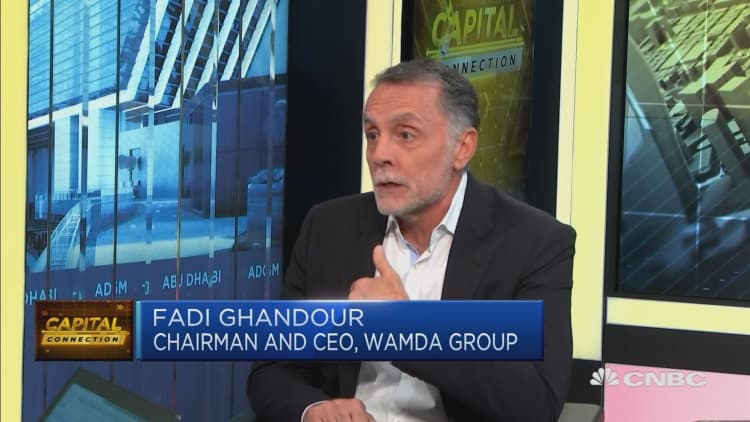
In a part of the world better known for towering skyscrapers and oil than for its startup scene, Gulf Arab entrepreneurs might be seeing bright times ahead. That's according to Fadi Ghandour, executive chairman of Wamda Group, whose venture capital fund invests in tech companies all over the Middle East and North Africa.
"For years we've said there is an inverse relationship between how change happens on the regulatory environment and the price of oil -- the lower the price of oil, the faster the change process happens," Ghandour told CNBC's Hadley Gamble on Thursday, pointing to Arab Gulf countries like Saudi Arabia and the United Arab Emirates whose economies have historically been dependent on hydrocarbon revenues.
Now that oil prices are dramatically down from their October highs, the veteran Middle East investor says the market moves "will definitely be a blessing in disguise" and in that it will force the development of sustainable, knowledge-based economies and jobs. He believes that startups founded five or more years ago are now reaching their maturity stage, meaning there will be more businesses scaling up in the next several years — if they can get the necessary support.
"These companies born somewhere around 2011, 2012, have raised much more money, they are growing much faster, the region is adopting mobile smartphone technology much faster, they are interacting much faster and at a much larger scale, specifically in Saudi Arabia," Ghandour said.
"This is the time when there is size, there is scale, and the big funds globally who don't want to take the risk early on, are going to be looking for entry into a market that they don't have much presence in." He pointed to New York-based global equity firm General Atlantic's investment of $120 million in Dubai-based website Property Finder last November. The Middle East real estate platform was founded in 2007 and has been profitable since 2013.
Investments in Middle East and North Africa (MENA)-based startups went up by 31 percent between 2017 and 2018 to $893 million, with 366 deals made, according to Magnitt, a regional data platform for investors. The database also found that more than 155 institutions invested in MENA startups in 2018, 30 percent of which were from outside the region and 47 percent of which had not previously invested in the region.
More work to be done
But regional investors, like high net-worth families and individuals, remain risk-averse, especially when it comes to investing in tech, Ghandour admitted.
Ghandour also highlighted Saudi Arabia as a major source of potential for startup growth, noting the money from its Public Investment Fund going into tech startups, though he says that more can be done by the government to support this growth.
A report by Wamda shows that while small and medium enterprises (SMEs) constitute some 90 percent of Saudi businesses, they contribute to only 20 percent of its GDP, despite Saudi Arabia having the largest market in the Gulf in terms of consumer spending and a population of 33 million.
Supporting those small businesses will be key to bringing in more non-oil private sector revenue. Ghandour believes the kingdom's Vision 2030, an ambitious initiative to diversify the economy away from oil and create new jobs, has set into motion numerous important reforms.
The majority of Saudi startups are in software services, e-commerce or technology solutions, Wamda found. The kingdom has made progress in reducing red tape and liberalizing various sectors, investors say, and it has also seen growth in start-up accelerators and tech incubators, which now number at around 40.
Saudi Arabia's private sector challenges
But the kingdom's private sector faced headwinds in the last year amid higher local energy costs, the introduction of VAT and fees imposed for hiring expat workers. Saudi Arabia's 2019 budget plans to boost spending by 7 percent despite its growing budget deficit in order to boost an economy hurt by lower oil prices.
And foreign direct investment (FDI) has been falling steadily since 2008 — that year saw a high of $39.5 billion in FDI, dropping nearly every year and chalking a mere $1.4 billion in 2017, according to the UN. Obstacles remain in the form of skills shortages, lower oil prices and rising unemployment in the kingdom, as well as growing international concern over the unpredictability and repressive tactics of the kingdom's powerful young crown prince, Mohammed bin Salman.
Still, with a booming youth population and access to a massive regional market, Ghandour sees longer term potential in the kingdom.
"Saudi Arabia is a huge market, e-commerce is flourishing fantastically," the CEO said. "You're seeing new software companies popping out of there, and this is at the core of the change strategy happening there, so all they need to do is invest much more in it, and you will see in the next five to ten years a very promising and flourishing tech ecosystem."


